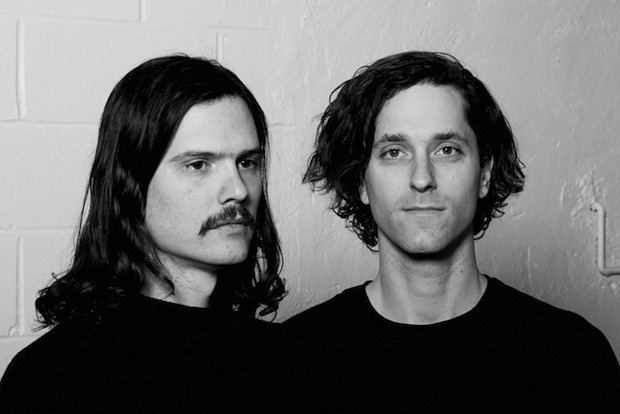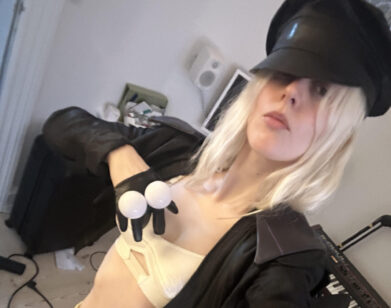Exclusive Video Premiere: ‘Far,’ Eaters

ABOVE: EATERS
Listening to Eaters’ self-titled debut record—out this week on Joel Ford’s momentum-building Driftless Recordings—is like sitting down with its creators in front of an old hi-fi, thumbing through a carton of vinyl, and recalling the exact moment you first heard each seminal influence. The Brooklyn duo of recording engineer Jonathan Schenke and multi-instrumentalist Bob Jones have lovingly brought to life an album that pays tribute to a range of stylistic ventures, all of which were considered much more “out” when they first arrived than in today’s gluttonous, self-cannibalizing music scene: warped Vocoder missives, off-the-deep-end funk explorations, and songs framed as immersive, analog synth landscapes. Eaters will celebrate their deep-rooted love of sound as they commemorate the album’s release this Thursday at Glasslands, joined by fellow experimentalists Yvette and Dan Friel. We’re also pleased to premiere Eaters’ video for “Far,” below.
LEO MAYMIND: I wanted to discuss the idea of letting the process dictate the results of a record. What was the process of making this record in terms of distribution of tasks? Jonathan, you are a recording engineer—did you record the whole thing?
JONATHAN SCHENKE: Most of it, I suppose, although Bob did a lot of work on his own too. The project started off as Bob’s thing, with me recording and working out arrangements.
BOB JONES: We traded guitar lessons for recording time.
SCHENKE: But once we got going, we realized we’d have a lot more fun working collaboratively.
MAYMIND: How long did it take before that started happening?
JONES: The sessions were pretty spread out. The first half of the record is from a session we did about two years ago, which we finished and were like, “That was great! We should do this again.” It took a while to get back to it.
MAYMIND: Did anything change in that break in terms of the recording process? Did you re-approach things in a new way?
JONES: Absolutely! Coming back knowing it would be a full on collaboration really opened things up.
SCHENKE: We spent a lot of time talking about what we wanted to go for. It ties back into your original question—the process, the mindset.
MAYMIND: What were some of the things that were mentioned when discussing what you wanted to go for?
JONES: This idea of really honoring ideas for the idea’s sake. Trying to inhabit the moment and let that guide us to the next step.
MAYMIND: Right. Taking the focus away from the final result. Is the idea of spontaneity something that either of you let guide your lives outside of music?
SCHENKE: Yeah, definitely.
JONES: For me, it’s a challenge. I feel like it’s a common symptom of modern life. I think that to be spontaneous is to be in the moment. And we are surrounded by all kinds of messages that are trying to take us out of being just fine where we are—adverts, Facebook, Twitter, all that stuff. And I don’t always find it natural to “be in the moment.” I worry about my mom and get stressed about money. But that’s me. Jonny seems to me to be really different and it’s part of why I love working with him! The act of making this music was so affirmational to this process—the end result, too!
MAYMIND: So, Jonny, you are the more spontaneous one. What is the most spontaneous thing you’ve ever done?
SCHENKE: Most recently, I guess it was climbing up the side of an abandoned silo in Auckland with Andrew and Austin from Parquet Courts. We almost got arrested, and I have a gnarly scab on my shin to show for it.
MAYMIND: There doesn’t seem to be a stylistic connection between all the songs, but there does seem to be an affinity for rich, analog-driven tones. How would you say this shapes the songs? Did you guys use a lot of analog gear?
SCHENKE: Yeah, the studio I work at—Doctor Wu’s—has a pretty sick synth collection.
JONES: I think the textures and timbres inform the music. At this point to me, the sounds and the melodic/harmonic material are kind of two sides of the same coin. The analog equipment also lends itself to a degree of spontaneity.
MAYMIND: Definitely. The record has some nice white noise moments—what draws you to white noise?
SCHENKE: I grew up listening to industrial music! Skinny Puppy was a huge for me. But Aphex Twin is an all time favorite. His stuff goes pretty hard in that realm too, but balanced with these gorgeous melodies, which is something we’ve talked about a lot with Eaters—that kind of dichotomy. Noise is part of that balance, I suppose. Having something visceral and disconcerting wrapped around something your mom can whistle is a pretty exciting way to hear a song.
EATERS IS OUT TOMORROW ON DRIFTLESS RECORDINGS. EATERS WILL PLAY GLASSLANDS THIS THURSDAY, APRIL 17. FOR MORE ON THE BAND, PLEASE VISIT ITS FACEBOOK PAGE.






